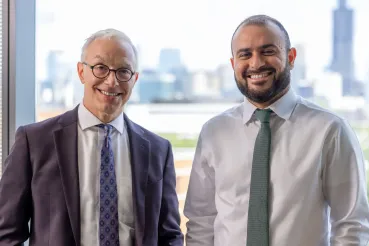You have nasty neck pain that just won’t go away. You notice changes in your coordination that go beyond a few clumsy steps here and there. You know it’s time to see a doctor. But should you see a neurologist or a neurosurgeon? What’s the difference?
We asked two experts — a neurologist and neurosurgeon — to explain how their specialties differ. They offer guidance if you’ve got concerns about your symptoms.
What do neurologists and neurosurgeons have in common? How are they different?
“Both neurologists and neurosurgeons are specialists who deal with diseases of the nervous system, which includes the brain, the spine and the peripheral nerves,” says Stephan Munich, MD, a neurosurgeon and director of skull base neurosurgery at Rush.
“They have complementary but distinct roles in the care of neurological conditions,” says Dixon Yang, MD, MS, a neurologist at Rush. “But a neurologist will focus on diagnosis and nonsurgical treatment of neurological disorders, while a neurosurgeon uses surgical techniques to treat these conditions.”
Is it best to see a neurologist or a neurosurgeon first?
The best way to find out which specialist you need to see first is often to ask your primary care provider.
“Your primary care provider can help make a referral to either specialist,” Yang says. “They’ll work closely together to help you determine the best personalized care approach.”
A neurologist like Yang is often the first specialist you’ll see if you have a neurological problem like migraine headaches, dementia or neuropathy. These specialists are especially skilled at neurological detective work.
“Our first steps will be to take a thorough history from the patient,” Yang says. “The patient’s account of the problem will often guide a neurologist towards next steps. Then, we’ll conduct a neurological exam to provide physical clues on diagnosis.”
This exam is meant to see how your nervous system is working. It can involve questions and tests of memory, speech, muscle strength, senses and balance. Depending on the results, your neurologist may recommend further tests, such as imaging.
With the findings from your exam and tests, a neurologist can create a personalized care plan. If you are dealing with a chronic neurological condition such as multiple sclerosis or Parkinson’s disease, a neurologist can coordinate long-term treatment. Or they can refer you to another specialist for further care.
But there are exceptions to the “neurologist first” rule, particularly if you have an emergency neurological condition that requires surgery.
“One example might be if you visit the emergency room because of a sudden and severe headache. A brain scan might reveal a brain hemorrhage, or brain bleed,” Yang says. “This may require emergent, lifesaving surgery from a neurosurgeon to remove the blood and relieve pressure within the skull.”
How do neurologists and neurosurgeons work together for patients?
Munich notes that neurologists and neurosurgeons will often combine their expertise to treat patients.
For example, a patient who had a recent stroke might see a neurosurgeon and a neurologist who specializes in stroke care during the same appointment. That way they can get the benefit of both perspectives on their treatment.
“Having the collaboration between neurologists and neurosurgeons is critical to optimize the care for the patient and achieve the best results,” Munich says. “There may be times when medication is the more effective way to treat a disease. In other cases, it may be surgical. In some cases, we might want to improve the patient’s medical condition to optimize the outcomes of surgery. Or we might perform surgery if medical therapy doesn’t give the results we had hoped for.”
How can patients prepare for an appointment with a neurologist or a neurosurgeon?
Yang notes that bringing your medical records to your appointment with a neurologist or neurosurgeon can be helpful. This includes documentation from physicians you’ve seen, a list of your medications and the results of any previous tests.
“Recent imaging is also helpful as it allows your neurologist to directly review testing and upload results to their electronic medical system,” Yang says. “This information could help facilitate a smooth transition of care with your neurologist and avoid repeating testing.”
You may also want to bring a friend if you have mobility or balance issues. If you are making an appointment for a loved one with confusion or memory problems, it’s helpful to be there during the visit.
“A trusted friend or loved one can often help fill in the gaps with additional history and medical information of the patient,” Yang says. “Also, they often help the patient make the trip to the appointment or provide emotional support, which are all important in the patient’s care.”
What are the benefits of seeing a neurologist or neurosurgeon from an academic medical center?
Neurological issues can be very complex and need care provided by a team of experts from different specialties. At an academic medical center, physicians from many fields can work together on your treatment.
“This includes collaborative expertise in neurology, neurosurgery, endovascular surgery, neurocritical care, pharmacy and radiology,” Yang says.
These centers are also usually involved in research and clinical trials, which may offer treatment options you can’t find anywhere else.
“The patient can have access to comprehensive and cutting-edge neurological care at academic medical centers that might not be available at community centers,” Yang says. “Academic centers also stay up to date on the most recent advances in the diagnosis and management of neurological conditions.”
Munich also believes that patients with neurological issues benefit from receiving care where there is a wide range of subspecialists. For example, Rush's skull base and pituitary surgery team relies on doctors from more than 10 specialties, including neurosurgeons, plastic surgeons, head and neck surgeons and rhinologists, also known as ear, nose and throat physicians.
“It’s really critical to have all of these subspecialists working together on the same team to provide comprehensive care,” Munich says.
If you’re having neurological symptoms and need testing or treatment, call Rush at (888) 352-7874. You can also learn more on our Neurology and Neurosurgery Services page.




